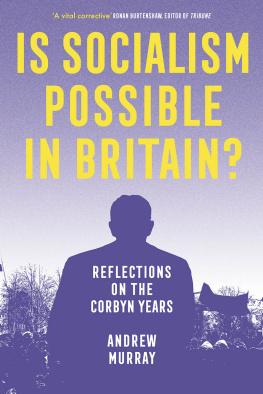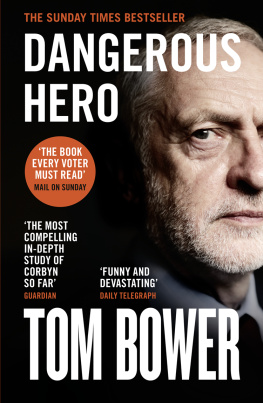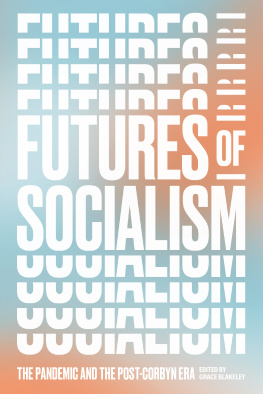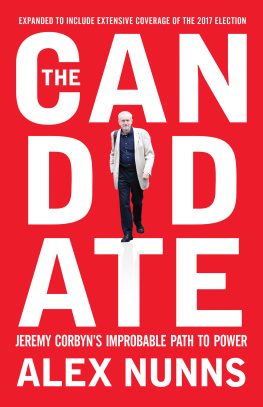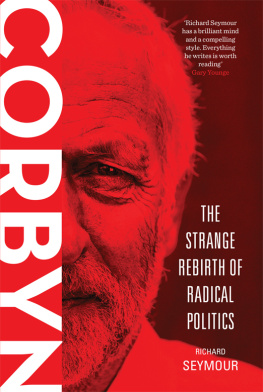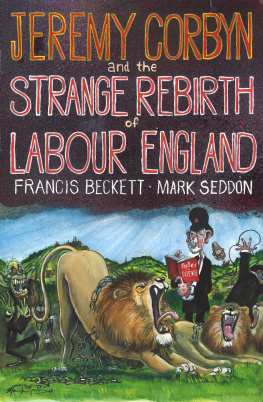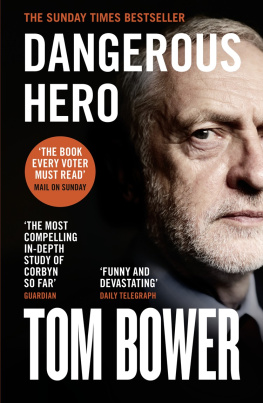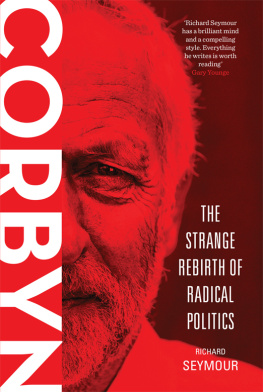Contents

Is Socialism Possible in Britain?
Andrew Murray is an author and campaigner. He has served as chair of the Stop the War Coalition, chief of staff of Unite the union and as advisor to Jeremy Corbyn when he was leader of the Labour Party. His numerous books include Off the Rails, Stop the War: The Story of Britains Biggest Mass Movement (with Lindsey German) and The Fall and Rise of the British Left.
Is Socialism
Possible in Britain?
Reflections on the Corbyn Years
Andrew Murray

First published by Verso 2022
Andrew Murray 2022
All rights reserved
The moral rights of the author have been asserted
1 3 5 7 9 10 8 6 4 2
Verso
UK: 6 Meard Street, London W1F 0EG
US: 388 Atlantic Avenue, Brooklyn, NY 11217
versobooks.com
Verso is the imprint of New Left Books
ISBN-13: 978-1-83976-664-0
ISBN-13: 978-1-83976-666-4 (US EBK)
ISBN-13: 978-1-83976-665-7 (UK EBK)
British Library Cataloguing in Publication Data
A catalogue record for this book is available from the British Library
Library of Congress Cataloging-in-Publication Data
Names: Murray, Andrew, 1958 author.
Title: Is socialism possible in Britain? : reflections on the Corbyn years / Andrew Murray.
Description: London ; New York : Verso, 2022. | Includes bibliographical references and index.
Identifiers: LCCN 2022017144 (print) | LCCN 2022017145 (ebook) | ISBN 9781839766640 (paperback) | ISBN 9781839766664 (ebk)
Subjects: LCSH: Labour Party (Great Britain) History 21st century. | Socialism Great Britain History 21st century. | Corbyn, Jeremy. | Great Britain Politics and government 2007
Classification: LCC JN1129.L32 M87 2022 (print)
| LCC JN1129.L32 (ebook)
| DDC 324.24107 dc23/eng/20220623
LC record available at https://lccn.loc.gov/2022017144
LC ebook record available at https://lccn.loc.gov/2022017145
Typeset in Fournier MT by Hewer Text UK Ltd, Edinburgh
Printed and bound by CPI Group (UK) Ltd, Croydon, CRO 4YY
There is nothing more difficult to carry out, more doubtful of success,
nor more dangerous to handle, than to institute a new order of things.
Machiavelli, The Prince
Contents
Introduction
The Shameful Footnote?
According to the organ of British finance capital, Jeremy Corbyns leadership of the Labour Party was a shameful footnote in Labour history. Today, the Financial Times can relax. Normal service to big business has been resumed under the pallid leadership of Sir Keir Starmer.
Other views are available. Around half a million people joined Labour in the period of the shameful footnote, making it bigger than all other political parties in Britain combined. They were inspired by the opportunity of a different, socialist, politics. Over 40 per cent of the electorate voted Labour in 2017 in the hope that real change in a society degraded by inequality and austerity was possible.
Alas, it wasnt. Nevertheless, the Covid pandemic which followed hard on the heels of the 2019 general election proved that much of the Corbyn prospectus is indeed the common sense of our times. The Telegraph has gloomily conceded that numerous proto-Corbynite economic ideas have been adopted by Boris
When Corbynism does enter the history books it may indeed be as more than a footnote; perhaps rather a template for the future. For it was a bold attempt to re-establish socialisms relevance as the most compelling solution to the many problems that Britain and the world face. To quote the FTs Martin Wolf: We are living in an era of multiple crises: Covid-19; a crisis of economic disappointment; a crisis of democratic legitimacy; a crisis of the global commons; a crisis of international relations; and a crisis of global governance.
Jeremy Corbyn had something novel and important to say about each of these crises. That distinguishes him from both Boris Johnson and Keir Starmer. The latter has peevishly sought to exclude his predecessor from political life. Exorcising the reverberations of his leadership will be harder, and certainly beyond Starmers capacities.
The last book by the present author was entitled The Fall and Rise of the British Left. It appeared in the autumn of 2019 and was apparently a spectacularly mistimed work, since the left in question was trembling on the threshold of a substantial and significant fall. It sought to explain how the rise of Corbynism or something like it was predicated on observable political trends which the conventional wisdom had contrived to overlook.
This book attempts to look at what went wrong, and why Corbynism failed. There is a small body of literature looking at Corbyn and the movement he led, after his own fashion. Serious and insightful assessments have been written by Sunday Times/Times journalists Gabriel Pogrund and Patrick Maguire and Guardian columnist Owen Jones. That pretty much covers the field.
Nevertheless, the defeat of the best chance of electing a government committed to socialist change in my lifetime deserves examining on a broader canvass. Many of the problems that beset the Corbyn leadership, including all the decisive ones, will likely confront any similar project in future in one form or another. Those issues have to do with power in society who holds it and how it is exercised; the nature of the Labour Party and the history of reformism; the new cultural divides associated with, but not identical to, the rise of right-wing populism; the snares of parliamentarism; the evolution of class; capitalist globalisation and its impact on the nation-states scope for initiative; the mass media; and more.
This book aims to examine these problems, refracted through the 201519 period in Labour and British politics. It therefore covers some of the same ground as the works mentioned above. The object is not just to describe the recent past and outline the difficulties we faced in giving effect to the hopes Corbyn aroused, but also to suggest how they can be more effectively addressed in the future. They will need to be.
Is Socialism Possible? attempts to synthesise memoir, history and analysis. It is informed in part by the authors own involvement in the team around Jeremy Corbyn, who I have known for many years. It further reflects my engagement with socialist politics, anti-war campaigning and the trade union movement since the mid 1970s. I was a member of the Communist Party until 2016, when I joined Labour at the behest of my union.
In terms of my own part in the Corbyn leadership, I was from 201517 no more than one of many informal advisors. Any influence I exerted came from my post as chief of staff at Unite, which was, under Len McCluskeys direction, a bulwark supporting Corbyn, above all during the 2016 Parliamentary Labour Party coup attempt. Thereafter, I was brought in to the leadership of the 2017 general election campaign to add managerial authority. From October 2017 my role was formalised as a part-time advisor in the Leader of the Oppositions Office (LOTO), seconded for part of the week. That arrangement continued until the end of Corbyns leadership. I attended the Leaders Strategy Committee, the establishment of which I had recommended after the 2017 general election, and a number of other meetings. My responsibilities fluctuated over time, covering at one time or another preparing for government, international issues and various communications and mentoring roles. I offered a lot of strategic advice, some of it solicited and some of it followed. I worked particularly closely with Seumas Milne, whom I have known for over forty years, and Karie Murphy, a more recent acquaintance. Both sweated blood for the cause. I have no wish to exaggerate my own role much of what was done, whether it was done well or not, happened without my intervention, and I was largely detached from the daily rough-and-tumble. I did enough, however, to earn the bile of the bourgeois media, from

